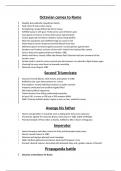Octavian comes to Rome
Wealthy but politically insignificant family
Took name of Gaius Julius Caesar
At beginning, image defined by link to Caesar
Fulfilled Caesar’s will- gave 75 denarii to each of Rome’s poor
Gave games in honour of Venus that Caesar had promised
Comet appeared over Rome- linked to Caesar being deified
Won him popularity and solidified image as Caesar’s heir
Mark Antony, former lieutenant showed himself to be heir
Delivered speech at funeral against assassins- turned opinion against them
Senators saw Octavian as lesser of two evils- voted to be inducted into senate
Sent to lead army against Antony at Mutina, 43BC
Hirtius and Pansa, consuls, killed and Antony fled//Octavian had sole command of the
Senate’s army
Senate tried to curb his victory and not give him honours, he refused to fight Antony again
Marched his army onto Rome to demand consulship
Declared consul August 43BC
Second Triumvirate
Octavian formed alliance with Antony and Lepidus in 43BC
Ratified by law- gave them powers for 5 years
Proscriptions- named individual senators as public enemies
Property confiscated and could be legally killed
Eliminated political opponents
Gained money from selling confiscated properties
At least 100, as many as 300 out of 900 senators killed
36BC, Octavian bribed Lepidus’ legion to turn on him- ended his career
Avenge his father
Had to avenge father or would be seen as failing their duty (mos maiorum)
Triumvirate against the assassins Brutus and Cassius in 42BC, battle of Philippi
Promised temple of Mars Ultor as thanks, fulfilled in 2BC in forum of Augustus
Imperator
Sextus Pompeius had taken control of Sicily and blockaded trade routes
Almost caused famine in 39BC
Octavian and Agrippa planned naval campaign
36BC, big fleet gathered and trained- destroyed Pompeius’ army
Erected a Rostral Column, decorated with defeated ships and a golden stature of himself
Propaganda battle
Octavian as benefactor for Rome:
, Public works, 42BC Temple of the Deified Julius Caesar, 34BC new stone amphitheatre, urban
renewal, public buildings, new sewer systems, Agrippa throwing tokens to be exchanged for
clothes into crowds at the theatre, free admission to public baths and gifts of oil and salt to
the poor
Octavian as Apollo’s favourite:
Traditionally, Hellenistic kings associated themselves with gods- maybe dangerous, allowed
rumour to circulate that he was Apollo’s son (Apollo in form of snake, same as Alexander the
Great)
Livia and Augustus:
From oldest Roman family, beautiful and intelligent, hand spun all of Octavian’s clothes,
embodied traditional roman values
Octavian seals Antony’s fate:
Seized Antony’s will from the Vestal Virgins in 32BC, read aloud that he wanted to be buried
in Alexandria- proof of disloyalty, blamed Cleopatra and declared war against her, not a civil
war
Octavian brings Peace:
Bringing peace to the empire by destroying a foreign enemy
Antony’s mistakes
36BC, moved to Alexandria full time, still married to Octavia
Two children- Alexander Helios and Cleopatra Selene
Had coins minted to show him and Cleopatra
Seen by many as wrong to have a foreign queen on Roman coins
Donations of Alexandria in 34BC, used Cleopatra’s money to invade Armenia
Did not celebrate a roman triumph, paraded through Alexandria
Gave roman land to Cleopatra and her army
Cleopatra proclaimed “queen of kings”
Battle of Actium
31BC
Naval battle, off the coast of Greece
Antony and Cleopatra fled to Alexandria
Following year, Octavian arrived in Alexandria with an army
Antony fell on his sword, Cleopatra tried to negotiate but killed herself to avoid being
paraded through Rome
Octavian took Egypt as a province of Rome
Agrippa main strategist
Honours given to Octavian
Given Civic Crown, for ending civil wars
Control of provinces in Spain, Gaul, Egypt and Syria- control of grain supply
Called Princeps, no extra power but implied leader of Rome
Commissioned a golden shield engraved with the 4 cardinal virtues- displayed in senate
house




